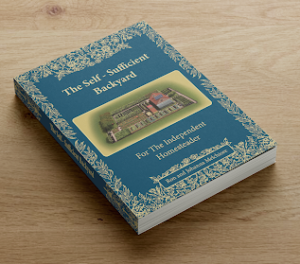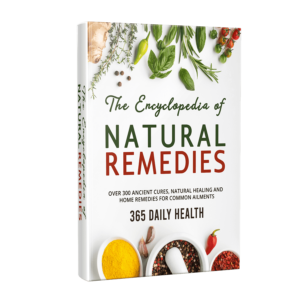Introduction
Home remedies have been used for hundreds of years to treat anxiety, insomnia, and stress but it wasn’t until more recently actual studies were done to tell us why they worked. Modern medicine is a wonder but I often wonder just how the herbalist of old knew what herb was helpful for what condition. Some of the most common herbs used to treat anxiety, stress, and insomnia include chamomile, lavender, passionflower, valerian root, kava kava, lemon balm, and skullcap. They offer an effective, natural way to address these common issues without relying on pharmaceuticals or other medications. Every one of these herbs has a unique benefit when it comes to alleviating the symptoms of anxiety, stress, and insomnia. Let’s look at each of these home remedies for anxiety, stress and insomnia.
Lavender
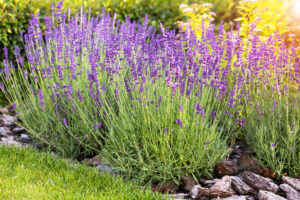
Lavender is one of the most well-known and widely used herbal remedies for treating anxiety, stress, and insomnia. It works by promoting relaxation, reducing inflammation, and calming the mind. Studies found lavender has the chemical properties linalool and linalyl acetate are responsible for the calming effects of this herb, as they work by targeting the neurotransmitters in the brain that regulate emotions and moods. Research has shown that when taken orally, these compounds can reduce both the subjective symptoms of anxiety and stress, as well as physiological arousal.
Lavender essential oil can reduce heart rate and improve sleep quality in individuals with insomnia. Another study found that inhalation of lavender essential oil decreased cortisol levels and resulted in a reduction of symptoms associated with anxiety. In addition, research has shown that lavender essential oil can reduce pre-operative anxiety and improve post-operative sleep quality.
Chamomile
Chamomile is another popular herbal remedy used to treat anxiety, stress, and insomnia. It works by promoting relaxation, reducing inflammation, and calming the mind. The chemical properties of Chamomile that help alleviate anxiety, stress, and insomnia have been identified as apigenin and luteolin. Apigenin is known to interact with the receptors in the brain which affect mood and emotions, resulting in calming effects. Luteolin has calming anti-inflammatory properties which can reduce stress and improve sleep quality.
Chamomile essential oil’s active constituents are alpha-bisabolol, chamazulene, matricine, and apigenin. Alpha-bisabolol is a natural anti-inflammatory and antispasmodic that can reduce symptoms of anxiety, while chamazulene has been found to have calming and relaxing effects. Matricine is known to affect the brain in a similar way as benzodiazepines, resulting in a decrease in stress levels and improved sleep quality. Finally, apiginin works by interacting with the serotonin receptors in the brain, resulting in a calming effect and improved mood.

Valerian Root
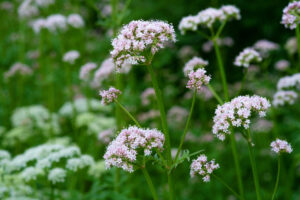
Valerian root works by increasing the levels of gamma-aminobutyric acid (GABA) in the brain, which is a neurotransmitter that helps reduce stress and anxiety. It is also known to improve sleep quality, as it binds to certain receptors in the brain that help regulate the sleep-wake cycle. In addition, valerian root has been found to have mild anti-anxiety effects due to its ability to bind with serotonin receptors in the brain.
Valerian essential oil is derived from the roots of the Valeriana officinalis plant and is used to promote relaxation and reduce stress. Its active constituents include valerenic acid, valerenal, and various terpenes such as limonene, pinene, and caryophyllene. Valerenic acid has been found to have sedative and anxiolytic properties, while valerenal is known to bind with GABA receptors in the brain which can help reduce stress levels. The terpenes present in the essential oil are known to have calming effects on the body, as well as anti-inflammatory and antispasmodic properties.
Passion Flower
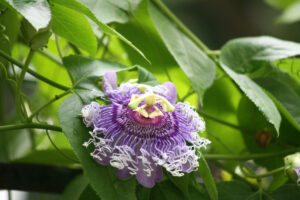
Passionflower works by increasing levels of gamma-aminobutyric acid (GABA) in the brain, which helps reduce stress and improve sleep quality. In addition, passion flower contains luteolin which has calming anti-inflammatory properties. It also looks quite pretty and unusual!
Lemon Balm
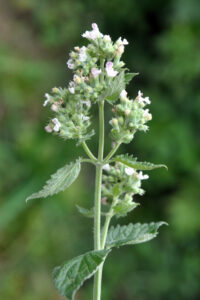
Lemon Balm works by increasing levels of gamma-aminobutyric acid (GABA) in the brain, which helps to reduce stress and anxiety. It also contains terpenes, which are natural compounds that have calming effects. Studies have found that Lemon Balm can reduce cortisol levels in the body, leading to reduced stress and improved relaxation. It has also been found to improve sleep quality by reducing the time it takes to fall asleep and increasing total sleep time.
Lemon balm essential oil can be used to help reduce stress and improve relaxation. It is derived from the lemon balm plant and contains therapeutic compounds such as monoterpenes, sesquiterpenes, and flavonoids that have calming properties. Studies have found that inhalation of lemon balm essential oil can lead to reduced anxiety, improved mood, and better sleep quality.
Kava Kava
Kava Kava works by increasing levels of gamma-aminobutyric acid (GABA) in the brain, just like Passionflower and Lemon Balm. This increase in GABA helps to reduce stress and anxiety, while also providing an overall calming effect. In addition, Kava Kava contains compounds such as kavalactones, which have mild sedative, anxiolytic, and muscle-relaxant effects. Studies have also found that Kava Kava can improve sleep quality by reducing the time it takes to fall asleep and increasing total sleep time.
Preparing Herbal Remedies at Home
Herbal remedies come in a variety of forms such as teas, tinctures, capsules, and even topical solutions, each offering unique properties that can be tailored to the individual’s needs. Preparing herbal remedies at home is relatively simple and involves making a tea or decoction, tincture, or syrup with the desired herbs. You can also infuse oils with raw herbs or use essential oils in diffusers and carrier oils. It is important to select quality herbs for your remedies and be aware of any potential side effects such as allergies or interactions with other medications. It’s important to remember just because herbal remedies are natural that does not mean they cannot hurt you or interact with any prescribed meds you may be taking. When in doubt, it is best to consult with a medical professional before using an herbal remedy.
This information is meant to be informative and entertaining. It is not medical advice. Always check with your medical provider before using any over the counter herb or other herbal preparation.
For more home remedies click here.
References:
https://pubmed.ncbi.nlm.nih.gov/12112282/
https://pubmed.ncbi.nlm.nih.gov/27790360/
https://pubmed.ncbi.nlm.nih.gov/30670268/

